Photography podcast #117 features an interview with fine art photographer Royce Howland where we discuss the ‘junk’ that can get into our photographs. In particular we discuss and dissect noise, halos and chromatic aberration in photography. We talk about how to avoid getting these problems, how to fix these problems and how for some photographers — these aren’t problems at all but rather, deliberate creative choices.
Royce does an AWESOME job of explaining these problems so that they are understandable to anyone.
This is the longest podcast I’ve published to date and it clocks in at around 70 minutes. We spend roughly 20 minutes on each of the 3 topics. We cover halos first, then noise, then chromatic aberration. Each of the 3 issues have very different causes and solutions.
Scroll to the BOTTOM of this post to find the player to immediately listen to the audio podcast.
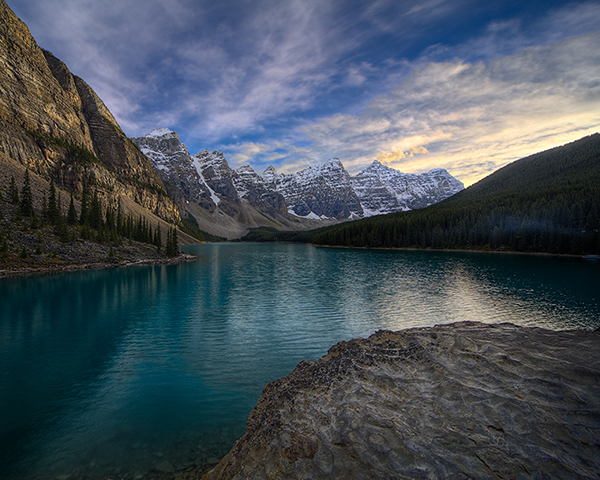
On the Rocks, Moraine Lake by Royce Howland — An HDR example where Royce controlled the settings to make sure no halos appeared in the sky or water.
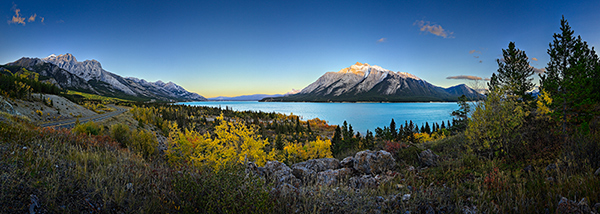
Fall at Abraham Lake by Royce Howland — Another HDR example where Royce left the haloing in the sky, and in fact accentuated it a bit more via a Photoshop Curves adjustment, to give a sense of glow over the mountains. So sometimes halos are not a flaw, they’re a creative choice.
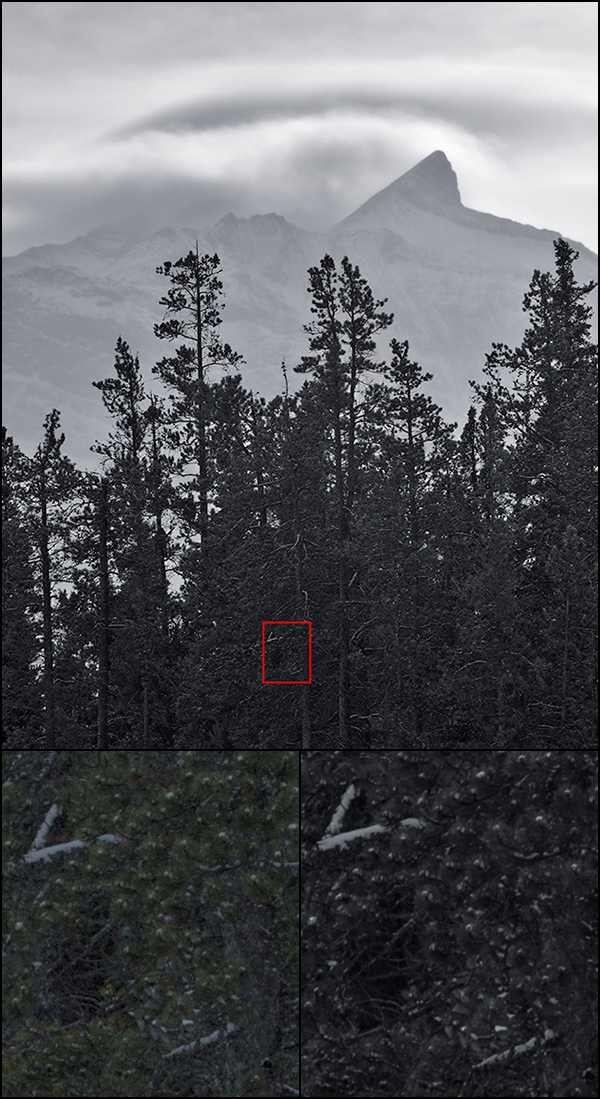
Looming, Abraham Lake by Royce Howland — An HDR example involving a high contrast backlit scene. The trees were deeply shadowed. Even on a Pentax 645D medium format camera, there’s noise in those trees in a normal single exposure. Bottom left — A 100% crop of a single exposure that went into the image above showing the level of noise in the trees. Bottom right — A 100% crop of the final image. Using a combination of HDR technique and a touch of additional noise reduction, I was able to subtly boost the contrast in the deep shadows, preserve all of the genuine detail, and also virtually eliminate the digital noise. Without HDR technique, just using a noise reduction filter can take the digital noise down but generally also will sacrifice legitimate detail as well.
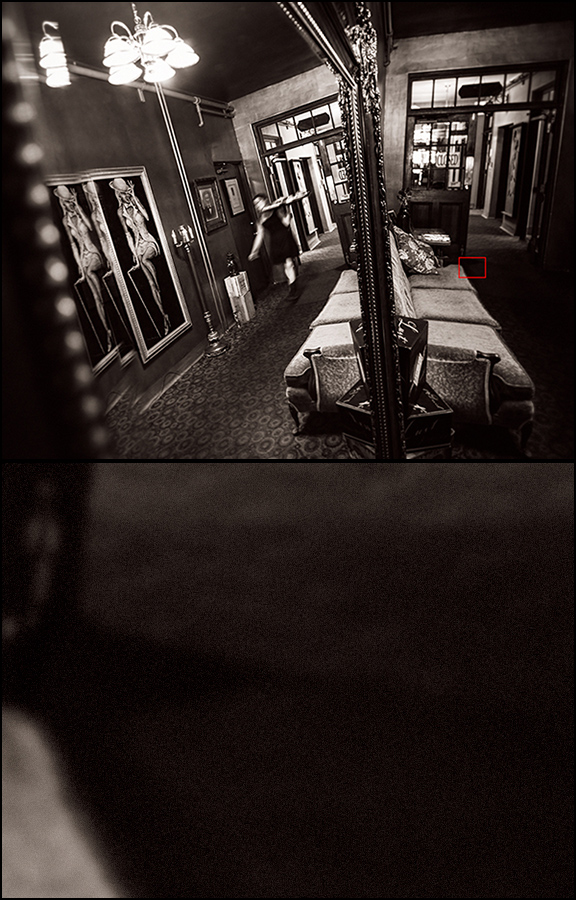
Ghost Of Server Present, Jerome by Royce Howland — An indoor shot taken with available light in somewhat dim conditions at a supposedly haunted hotel. I’m using a bunch of creative techniques here including shallow depth of field, a reflection in a mirror, subject motion blur and extra digital blurring. Despite the softening effects of all the techniques used in this image, I also wanted a bit of texture and bit of “vintage film grain” feel. So far from removing all digital noise, I actually controlled it and then added a uniform monochromatic grain layer on top of everything in Photoshop. In print up to 16x20 size it’s difficult to see this grain, but on a nice matte paper it gives a slight feeling of texture; whereas running noise reduction as I would normally do in fact makes the results looking flat and plastic. You can see the noise detail added in the bottom detailed part of the image.
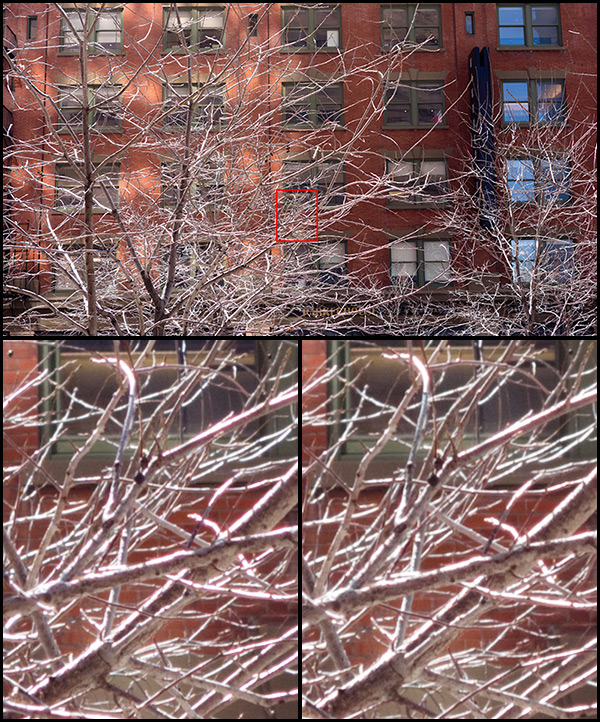
Chromatic aberration example at f/3.5 by Royce Howland — It was a bit after noon so the sun was high, and I shot straight into the light. The tree branches against a darker background show extremely high contrast edges. I was using a Sony RX100 pocket camera, which is a very high quality point & shoot with a Carl Zeiss lens. So a quality piece of kit for a compact. The first composition was at medium lens zoom and the aperture wide open — f/3.5. Bottom left — A 100% crop of the shot shows a lot of green and purple fringes are visible along the branch edges. Even towards the center of the lens, the chromatic aberration is pretty bad. This is a file converted from RAW using the latest Adobe Camera Raw in Photoshop CS6, no chromatic aberration removal. Bottom right — Now here’s the identical file, but using the green and purple fringe removal settings during RAW conversion. Quite strong settings were needed for the green fringes, not so strong for purple. Mostly the fringes were removed.
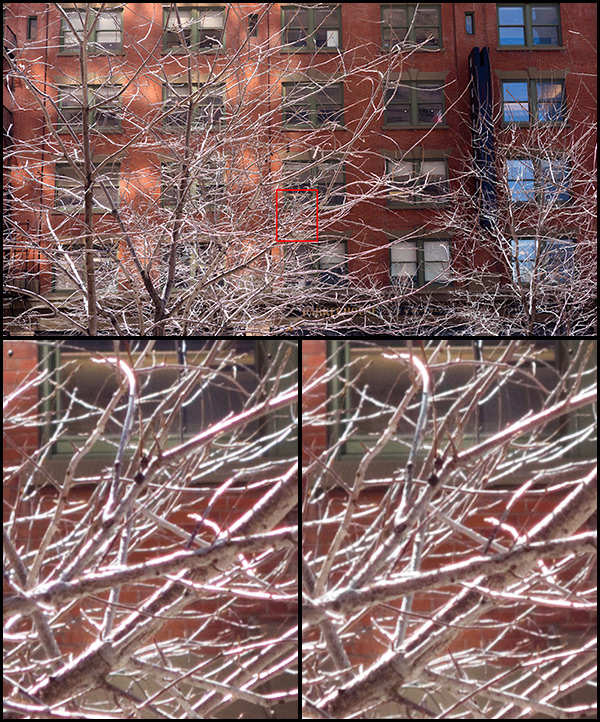
Chromatic aberration example at f/5.6 by Royce Howland — Now here is the same composition photographed again moments later in the same strong light, but stopping the lens down to f/5.6. Bottom left — Stopping the lens down just over 1 stop has actually gotten rid of many of the purple & green fringes without doing anything else. That’s because a slightly smaller aperture lets through less of the misaligned light rays that contribute to the chromatic aberration in the first place. This is a RAW file converted again with no chromatic aberration settings. Bottom right — And here’s the same file converted with a small amount of purple and green defringe settings, much less than needed in the first example and the results look better.
Links /resources mentioned in this podcast:
Royce Howland Photography
Photo realistic HDR podcast with Royce Howland
Wikipedia Chromatic Aberration
DXO Optics
Topaz Denoise
Nik DFINE 2
Noise Ninja
PTLens
Emily Carr Images - She deliberately painted in what we today call Halos. Shoreline, 1936 is an example.
If you liked this podcast and want to review it on Itunes, this link gets you to the main page
If you are interested in writing for our blog please contact me photography.ca ( A T ) G m ail Dot co m (using standard email formatting)
Please join the Photography.ca fan page on Facebook
My Facebook profile — Feel free to “friend” me — please just mention Photography.ca
My Twitter page — I will follow you if you follow me — Let’s connect — PLEASE email me and tell me who you are in case I don’t reciprocate because I think you are a spammer.
If you are still lurking on our forum,
feel free to join our friendly ![]() Photography forum
Photography forum
Thanks to Jared Fein and Enrique Waizel who posted a blog comment about our last podcast. Thanks as well to everyone that sent comments by email about our last podcast. Although ALL comments are appreciated, commenting directly in this blog is preferred. Thanks as well to all the new members of the bulletin board. Most of the links to actual the products are affiliate links that help support this site. Thanks in advance if you purchase through those links.
If you are looking at this material on any other site except Photography.ca — Please hop on over to the Photography.ca blog and podcast and get this and other photography info directly from the source. |Subscribe with iTunes|Subscribe via RSS feed |Subscribe with Google Reader|Subscribe for free to the Photography podcast — Photography.ca and get all the posts/podcasts by Email
You can download this photography podcast directly by clicking the preceding link or listen to it almost immediately with the embedded player below.
Thanks for listening and keep on shooting!
Podcast: Play in new window | Download


